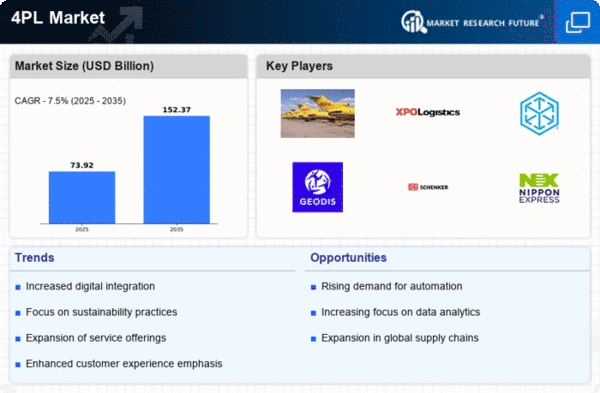Market Trends
Key Emerging Trends in the 4PL Market
4PL Market Trends
The 4PL (Fourth Party Logistics) market is experiencing dynamic trends and transformations, reflecting the ever-evolving landscape of supply chain management. As businesses strive for greater efficiency and optimization in their logistics operations, the role of 4PL providers has become increasingly significant. One notable trend in the 4PL market is the growing adoption of advanced technologies. As digitalization continues to reshape industries, 4PL service providers are leveraging technologies such as artificial intelligence, machine learning, and data analytics to enhance decision-making processes, optimize routes, and improve overall supply chain visibility.
Another prominent trend is the emphasis on sustainability and environmental responsibility within the 4PL market. With an increasing awareness of the environmental impact of logistics operations, businesses are seeking 4PL providers that prioritize eco-friendly practices. This includes the implementation of green transportation solutions, carbon footprint reduction strategies, and the integration of sustainable packaging practices. As sustainability becomes a key consideration for businesses globally, 4PL providers are aligning their services with these values to meet the evolving demands of their clients.
Furthermore, the 4PL market is witnessing a shift towards greater collaboration and partnerships among stakeholders. In an effort to create seamless and integrated supply chain networks, businesses are forming strategic alliances with 4PL providers, enabling them to streamline processes, reduce costs, and enhance overall operational efficiency. This collaborative approach also extends to the integration of various supply chain participants, fostering a holistic and interconnected logistics ecosystem.
The rise of e-commerce is yet another influential factor shaping the market trends of 4PL. The surge in online shopping and the subsequent demand for swift and reliable delivery services have propelled the need for agile and adaptable logistics solutions. 4PL providers are responding to this trend by investing in robust e-commerce logistics capabilities, including last-mile delivery solutions, warehouse automation, and order fulfillment technologies. This enables businesses to navigate the challenges posed by the e-commerce boom and deliver a seamless customer experience.
Moreover, geopolitical factors are playing a significant role in shaping the 4PL market landscape. Trade tensions, tariff fluctuations, and geopolitical uncertainties are prompting businesses to reassess their supply chain strategies. In response, 4PL providers are offering flexible and resilient solutions that can navigate the complexities of global trade dynamics. This adaptability is crucial for businesses seeking to maintain supply chain continuity and mitigate risks associated with geopolitical uncertainties.


















Leave a Comment